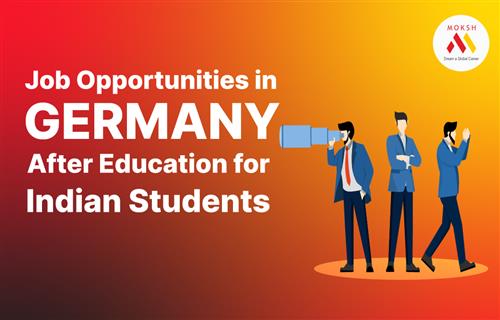If you are an Indian student looking for a practical route to a career in Germany, an Ausbildung could be your answer.
An Ausbildung is a training programme. It is a dual system, meaning you learn on the job and in a classroom. These programmes are a form of vocational education courses that last between two and three and a half years. A key benefit is that you earn a monthly stipend while you train.
This guide gives you the practical steps to find and apply for an Ausbildung. We also answer common worries about language and life in Germany. This is your complete overview of this officially recognised path to working in Europe.
What exactly is the Ausbildung system?
The Ausbildung system is Germany's famous "dual vocational training" model. It has two main types: dual and school-based. The dual model is the most common.
In the dual system, you serve an on-the-job training company half a day, and work on the other half of a day at a vocational institution. The average week could be divided as 3-4 days at work at the company, 1-2 days at school. For example, you could train as an electrician or a nurse.
When you finish, you get a state-recognised certificate. This is your key to a skilled job in Germany.
The German Mindset Behind Ausbildung
You may ask yourself why Germany is spending so much on this system. The answer is simple. Germans value skilled craftsmanship deeply. This system of vocational training courses is built to create these experts. They believe that a great electrician, nurse, or IT specialist is as crucial as a university graduate. This mindset is called “Handwerk” (craftsmanship). It is a point of national pride. The Ausbildung system is built to create these experts. For you, it means becoming a respected professional with a valued skill set through practical skills training.Why Indian students should consider Ausbildung (benefits)?
An Ausbildung offers Indian students some very clear and practical benefits:
- Earn while you learn: You get a monthly salary, called a stipend, from your training company.
- Low or no tuition fees: The company covers your training costs. You only pay for your living costs.
- A fast track to a stable job: There is a high demand for skilled workers in Germany, especially in trades like nursing, IT, and engineering.
- A way to stay: You can acquire a German visa permit once you complete it, and then apply to settle in the country.
The thought process behind it is that it is like developing a long-term career and not a short-term internship.
Ausbildung vs. Traditional Degree: A Quick Look
| Aspect | Ausbildung (Dual Vocational Training) | Traditional University Degree |
|---|---|---|
| Cost | You earn a salary. No tuition fees. | Often has tuition fees. You spend money to study. |
| Learning Style | Practical, hands-on training (70%) mixed with theory (30%). | Mostly theoretical and academic. |
| Duration | 2 - 3.5 years | 3 - 4 years for a Bachelor's degree |
| Goal | To become a skilled expert in a specific trade or field in Germany. | To gain broad academic knowledge in a subject. Often a step towards a Master's degree in Germany. |
| Pathway | Direct job entry after certification. | May require further training or a Master's degree. |
This shows Ausbildung is a more direct path to the workforce. It is perfect if you prefer doing things rather than just reading about them.
What Ausbildung courses can you apply for?
The selection of Ausbildung is dependent on your interests and skills. Here is a sample vocational courses list of the top and most in-demand areas of study among international students.
| Field & Common Roles | What You Will Do | Duration | German Level | Why It's a Good Fit |
|---|---|---|---|---|
| Healthcare (Nurse, Medical Assistant) | Patient care, clinical procedures, medical documentation. | 2-3.5 years | B2 (Recommended) | Very high demand nationwide. Leads to a stable job quickly. |
| IT Specialist | Software, networks, system administration. | 2-3 years | B1-B2 | Rapidly growing field with excellent pay after qualification. |
| Mechatronics / Mechanics | Work on mechanical systems, electronics, and maintenance. | 3-3.5 years | B1-B2 | High manufacturing demand. |
| Business & Administration | Office management and bookkeeping. | 2-3 years | B1-B2 | Skills that can be used for any industry. Great if you are organised. |
| Hospitality & Tourism (Hotel Specialist, Chef) | Guest service, kitchen skills, event management. | 2-3 years | B1 | Multicultural workplaces. Good for people-facing roles. |
| Automotive | Vehicle diagnostics, repairs, and electronics. | 3 years | B1-B2 | Strong demand in Germany's famous automotive sector. |
| Logistics (Warehouse & Freight) | Supply-chain management, warehousing, transport. | 2-3 years | B1 | High demand with many companies hiring international candidates. |
Quick tips for choosing your course:
- Match it to your skills: Are you good with people, or analytical?
- Assess the language requirement: Healthcare requires higher German proficiency (B2) than does logistics (B1).
- Look at demand: Fields like nursing, IT, and skilled trades are always needed.
Finding the Right Opportunity: Where to Look
You do not have to figure this out alone. Meduclinic can help you figure out what is best for you. You can filter for jobs that welcome international applicants through their help. It is also smart to look at the career pages of big German companies you know, like Bosch, Siemens, or Deutsche Bahn (railways). Many are actively looking for international trainees.
As you do not know the ins and outs of this program, connecting with Meduclinic can help you with every detail.
Student Pain Points & Quick Solutions
Starting an Ausbildung can feel daunting. Here is simple advice for common worries.
| Pain Point | Quick & Practical Solution |
|---|---|
| Language | Most programmes require German level B1 or B2. You can reach this level quickly with an intensive course from a specialised institute like Moksh Academy. |
| Visa & Documents | You will need a signed training contract to apply for your visa. The essential documents to have ready are your passport, a CV, and your German language certificate. |
| Your Qualifications | The good news is you can join an Ausbildung programme with a minimum of a 12th-grade education from a recognised school. |
| Money & Living Costs | All costs should be covered with your monthly stipend (approx. 800-1200 Euro). Do not forget major upfront costs such as a flat deposit and compulsory health insurance. |
Your Step-by-Step Application Roadmap
Here is a simple checklist of what to do to apply for an Ausbildung as an Indian student.
- Be ready: Have your documents ready (CV, school certificates). Start to learn German as soon as possible.
- Get to B1/B2 German: Gain a certification with an institution like Goethe-Institut. This may take a number of months.
- Interview & Contract: Successfully pass your interview and sign your formal training contract with an employer in Germany.
- Apply for a Visa: Visit the German Embassy to apply for a German work visa using your contract. This procedure probably takes three to four months.
- Move and registration: After you reach Germany, you need to find a place to live.
Life in Germany: What to Expect
Moving to a new country is a big adventure. Germans are often direct and value punctuality and rules. This may not seem comfortable initially, but it is only their style of doing things to be efficient. You will find many other international students there. You can join social groups to feel at home. Remember, everyone is nervous at the start. Be open-minded, and you will learn and grow immensely.
To Conclude
An Ausbildung is a realistic and valuable path for Indian students. It offers practical, paid vocational courses that lead to a stable career in Germany. Your journey starts with learning the German language. It is better to start your German language course training today. Imagine that it is not only a course, but your ticket to a new life as a professional in Europe.











.webp)
